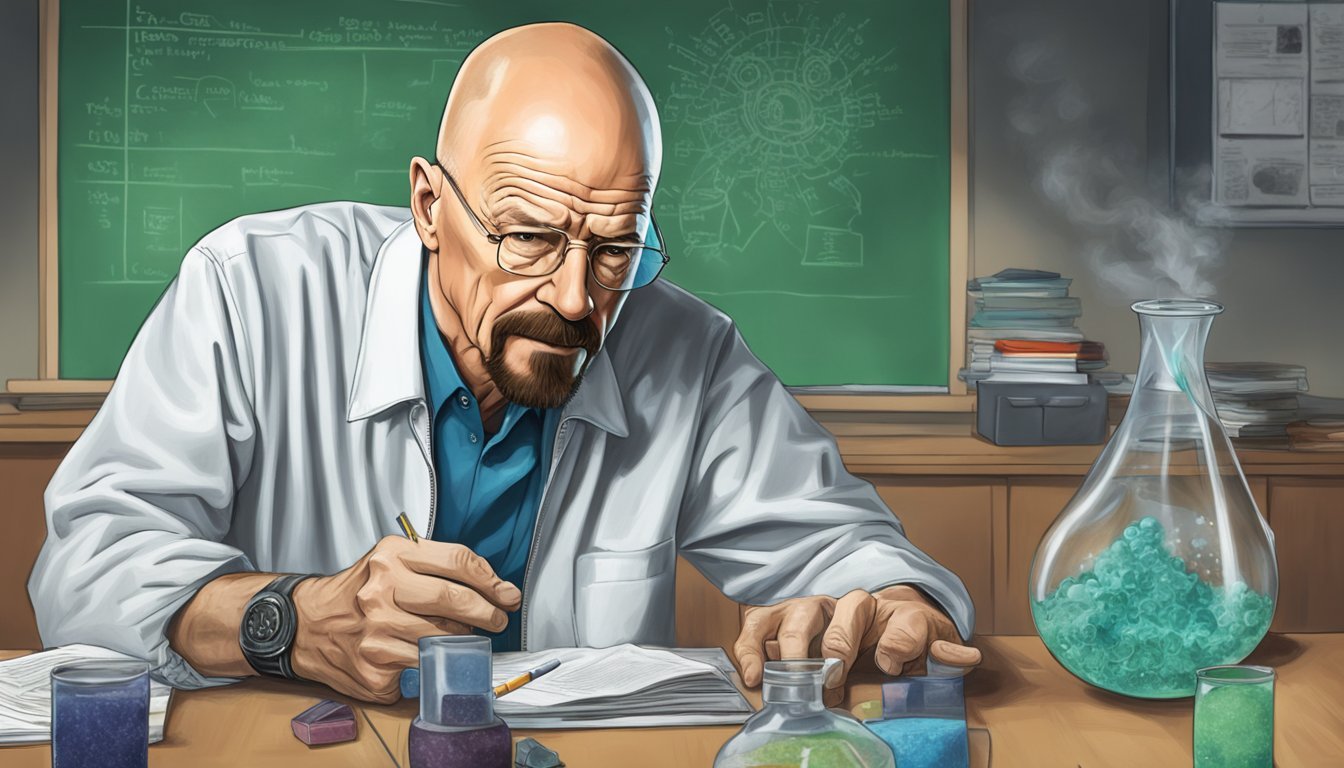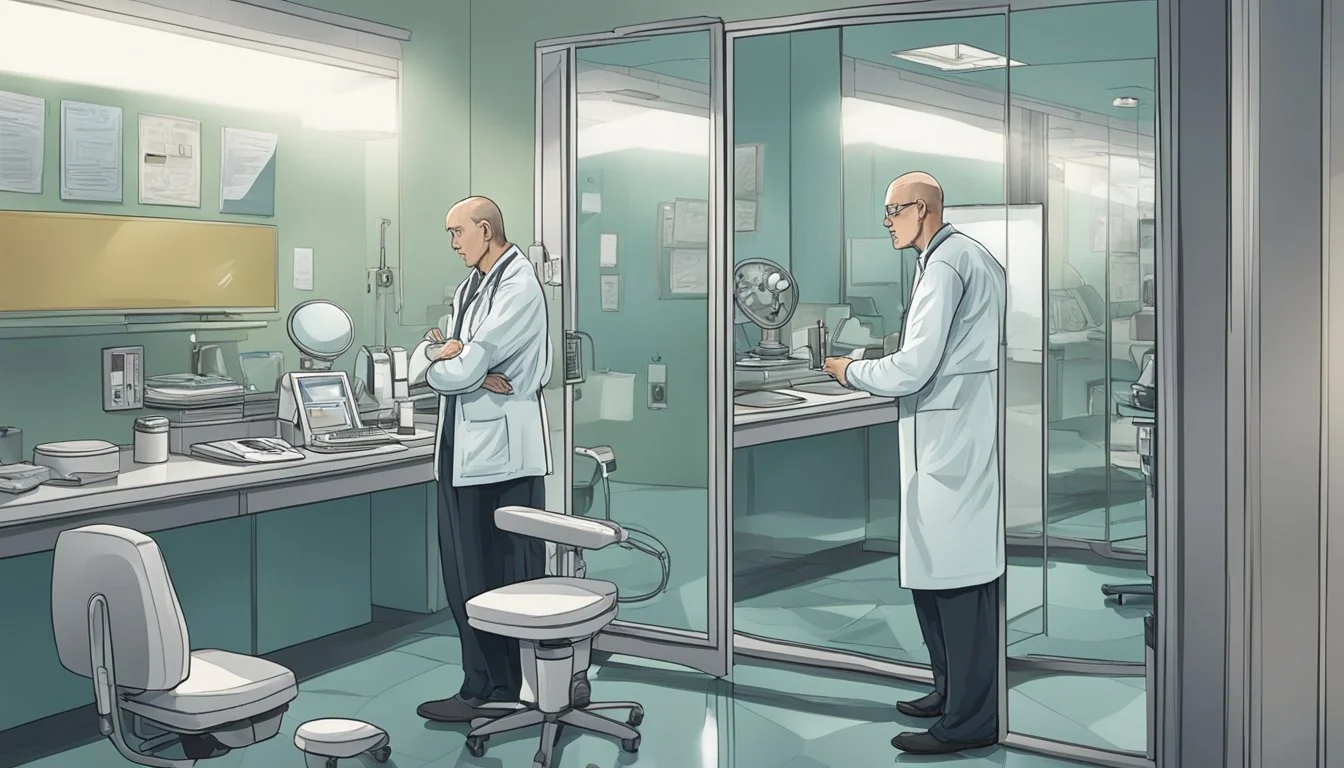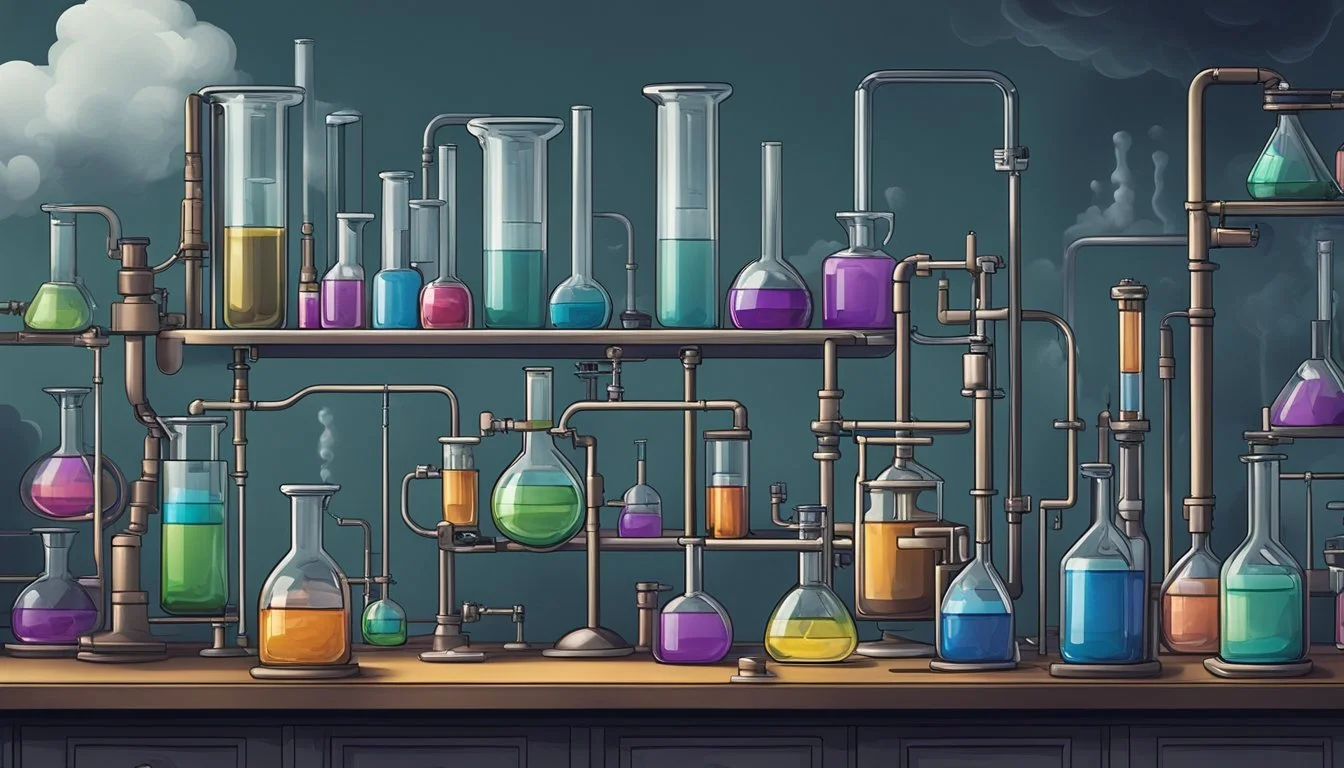Cancer as a Catalyst: The Significance of Walt's Diagnosis in Breaking Bad
Transforming a Teacher into a Criminal Mastermind
Breaking Bad's narrative hinges on a pivotal moment - Walter White's lung cancer diagnosis. This life-altering event sets in motion a chain of decisions that transform a mild-mannered chemistry teacher into a ruthless drug kingpin.
Walt's cancer serves as more than just a plot device. It acts as a catalyst, propelling him to confront his mortality and spurring drastic actions to secure his family's financial future. The diagnosis strips away societal constraints, allowing Walt to embrace his darker impulses and hidden talents.
The series skillfully uses Walt's cancer to explore themes of desperation, morality, and the lengths one might go when faced with limited time. It highlights the harsh realities of healthcare costs, as Walt grapples with expensive treatments that seem out of reach for a high school teacher. This financial pressure becomes a driving force behind his descent into the criminal underworld.
Walter White's Transformation
Walter White's journey from a struggling high school chemistry teacher to the notorious drug lord Heisenberg is a central element of Breaking Bad. His cancer diagnosis serves as the catalyst for this dramatic metamorphosis, pushing him into a life of crime and moral compromise.
From Chemistry Teacher to Heisenberg
Walter White begins as an overqualified high school chemistry teacher, struggling to make ends meet. His expertise in chemistry becomes the foundation for his illicit career in methamphetamine production. As he delves deeper into the drug trade, Walt adopts the alias "Heisenberg," inspired by the German physicist.
This new identity allows him to separate his criminal activities from his family life. Walt's scientific knowledge and attention to detail lead him to create a superior product, quickly gaining notoriety in the drug world.
The Role of Cancer in Walter's Decisions
Walt's lung cancer diagnosis is the pivotal event that sparks his transformation. Faced with overwhelming medical costs and a desire to secure his family's financial future, he turns to manufacturing methamphetamine.
The cancer diagnosis alters Walt's perspective on life and morality. It provides him with a rationalization for his illegal activities and a sense of urgency to accumulate wealth quickly. As his health fluctuates throughout the series, so does his commitment to his criminal enterprise.
The Development of an Antihero
Walt's evolution into an antihero is gradual but profound. Initially motivated by seemingly noble intentions, he becomes increasingly ruthless and self-serving as the series progresses.
His actions become more morally ambiguous, often justified by his initial goal of providing for his family. Walt's intelligence and chemistry skills, once used for education, now fuel his criminal empire. This transformation challenges viewers' sympathies, as they witness a once-relatable character descend into villainy.
Walt's journey explores themes of power, pride, and the consequences of one's choices. His character arc demonstrates how circumstances and personal decisions can radically alter a person's moral compass.
Medical and Emotional Impact of Cancer
Cancer diagnosis and treatment profoundly affect patients physically, mentally, and socially. The experience transforms lives, altering bodies, minds, and relationships in complex ways.
The Physical Toll of Chemotherapy
Chemotherapy, a common cancer treatment, targets rapidly dividing cells. This approach attacks cancer but also harms healthy tissues. Patients often experience fatigue, nausea, and hair loss. Appetite changes and weight fluctuations are frequent.
Chemotherapy can cause anemia, leading to weakness and shortness of breath. Nerve damage may result in numbness or tingling. Digestive issues like constipation or diarrhea are common side effects.
Immune system suppression increases infection risk. Patients may bruise or bleed easily due to low platelet counts. Skin changes, including dryness and sensitivity, can occur.
Psychological Effects of a Cancer Diagnosis
A cancer diagnosis often triggers a range of emotions. Shock, disbelief, and fear are typical initial reactions. Anxiety about the future and treatment outcomes is common.
Depression affects many cancer patients. Feelings of hopelessness or loss of control may arise. Sleep disturbances and concentration difficulties can impact daily life.
Some individuals experience anger or frustration at their situation. Others may feel guilt or question why they developed cancer. Body image concerns frequently emerge, especially with visible physical changes.
Family Dynamics in the Face of Illness
Cancer impacts entire families, not just patients. Roles often shift as the patient's needs change. Spouses or partners may become caregivers, altering relationship dynamics.
Children of cancer patients may experience fear and uncertainty. They might take on additional responsibilities or feel neglected due to the focus on the ill parent.
Financial stress can strain family relationships. Medical bills and potential loss of income create tension. Communication challenges may arise as family members process their emotions differently.
Support from extended family and friends becomes crucial. However, some relationships may become strained due to discomfort or misunderstanding about the illness.
The Birth of a Drug Empire
Walter White's cancer diagnosis catalyzed his transformation from a mild-mannered chemistry teacher into a ruthless drug kingpin. His descent into the criminal underworld began with a desperate plan to secure his family's financial future.
Establishing a Methamphetamine Business
Walt leveraged his chemistry expertise to produce high-quality methamphetamine. He aimed to earn quick money to cover his medical expenses and provide for his family after his death. Walt's scientific knowledge gave him a significant advantage in the drug trade.
His product stood out for its exceptional purity and distinctive blue color. This unique signature helped establish Walt's reputation in the criminal world. He adopted the alias "Heisenberg" to protect his identity and build a fearsome reputation.
Walt's initial forays into drug manufacturing were small-scale and fraught with danger. He faced numerous challenges, including finding a secure lab space and sourcing necessary chemicals.
Partnership with Jesse Pinkman
Walt teamed up with Jesse Pinkman, his former student, to enter the drug trade. Jesse's street-level connections complemented Walt's chemistry skills. Their partnership was often tumultuous but crucial to their success.
Jesse handled distribution while Walt focused on production. This division of labor allowed them to expand their operation rapidly. Their dynamic shifted over time, with Walt becoming increasingly dominant and manipulative.
The pair faced constant threats from rival dealers and law enforcement. They developed a series of elaborate schemes to evade detection and eliminate competition. Their partnership endured despite frequent conflicts and betrayals.
Consequences of Illegal Activities
Walt's drug empire brought unforeseen complications to his life. His criminal activities strained his relationships with family and friends. He struggled to maintain his double life as a family man and drug manufacturer.
The business exposed Walt to extreme violence and moral compromises. He found himself committing increasingly ruthless acts to protect his interests. His transformation into "Heisenberg" gradually consumed his former identity.
Walt's empire attracted dangerous adversaries, including rival cartels and corrupt individuals. He faced constant threats to his life and freedom. The stress of his illegal activities took a toll on his physical and mental health.
Breaking Bad's Narrative and Thematic Resonance
Breaking Bad's storytelling and themes deeply resonate with audiences through its complex characters, moral ambiguity, and exploration of human nature. The show's narrative structure and thematic elements contribute to its status as a landmark television series.
Vince Gilligan's Vision
Vince Gilligan created Breaking Bad with a clear vision: to transform an ordinary man into a criminal mastermind. This premise allowed for a deep exploration of morality and the human psyche. Gilligan's meticulous attention to detail and character development set a new standard for television storytelling.
The show's setting in Albuquerque, New Mexico, played a crucial role in shaping its unique atmosphere. The desert landscape served as a metaphor for Walt's moral decay and isolation.
Gilligan's approach to pacing and plot twists kept viewers on the edge of their seats. Each episode built upon the last, creating a snowball effect of tension and consequences.
Depiction of Cancer in Popular Media
Breaking Bad's portrayal of cancer broke new ground in television. Unlike many shows that use cancer as a plot device, it explored the psychological and emotional impact of a terminal diagnosis.
Walt's lung cancer served as a catalyst for his transformation, challenging viewers to consider how they might react in similar circumstances. The show didn't shy away from depicting the physical toll of cancer and its treatments.
This realistic approach resonated with many cancer patients and their families. It sparked discussions about healthcare, mortality, and the lengths one might go to secure their family's future.
Legacy and Cultural Impact
Breaking Bad's influence extends far beyond the television landscape. Its complex characters and moral ambiguity have become benchmarks for quality storytelling in all media.
The show's exploration of the American healthcare system and the desperation it can create struck a chord with viewers. It sparked debates about the cost of treatment and the ethical dilemmas faced by those with serious illnesses.
Breaking Bad's success paved the way for more ambitious, character-driven dramas on television. Its cultural impact is evident in the numerous references, parodies, and discussions it continues to generate years after its conclusion.
Impact on Family and Relationships
Walt's cancer diagnosis dramatically alters his family dynamics and relationships. It sets in motion a series of events that strain bonds, erode trust, and force loved ones into difficult positions.
Skyler's Journey and Decisions
Skyler White faces immense challenges as Walt's illness unfolds. Initially supportive, she grows increasingly suspicious of Walt's secretive behavior. Skyler grapples with difficult choices, balancing her desire to protect her family with the moral implications of Walt's actions.
As Walt's lies multiply, Skyler finds herself caught in a web of deception. She struggles to maintain normalcy for her children while dealing with the emotional toll of her husband's diagnosis and hidden criminal activities.
Fabrication and Betrayal
Walt's cancer becomes a shield for his illicit activities. He exploits his family's sympathy, using his illness as an excuse for unexplained absences and strange behavior. This manipulation erodes the foundation of trust within the family.
The web of lies grows more complex as Walt involves others in his deceptions. Family members and friends are unknowingly drawn into Walt's schemes, compromising their own integrity and safety.
Walter's Dual Life and Its Toll on Family
Walt's double life as a drug manufacturer places enormous strain on his relationships. He becomes emotionally distant, prioritizing his criminal enterprise over family obligations. This shift creates a palpable tension within the household.
His children, Walt Jr. and Holly, suffer the consequences of their father's choices. Walt Jr. struggles with the changing dynamic between his parents, while baby Holly grows up in an environment of secrecy and danger.
Walt's actions also impact extended family. His brother-in-law Hank, a DEA agent, becomes unwittingly entangled in Walt's criminal world, leading to devastating consequences for both families.
Legal Entanglements and Moral Ambiguity
Walt's cancer diagnosis propels him into a world of criminal activity, blurring ethical lines and challenging legal boundaries. His actions spark a complex web of consequences, raising questions about morality and justice.
DEA's Pursuit and Legal Challenges
The Drug Enforcement Administration (DEA) relentlessly pursues the elusive Heisenberg, unaware of his true identity. Walt's brother-in-law, Hank Schrader, leads the investigation, creating a tense dynamic within the family.
As Walt's empire grows, so does the DEA's determination to bring him down. The agency faces numerous obstacles, including jurisdictional issues and the sophisticated nature of Walt's operation.
Walt's ability to evade capture highlights the limitations of law enforcement in combating high-level drug operations. The DEA's pursuit raises questions about resource allocation and the effectiveness of current drug policies.
Walt's Justification of His Actions
Walt initially rationalizes his criminal activities as a means to provide for his family after his death. He clings to this justification, even as his actions become increasingly ruthless and self-serving.
His lies grow more elaborate, creating a facade of normalcy while concealing his double life. Walt's cancer becomes both a shield and a weapon, used to deflect suspicion and manipulate those around him.
As the series progresses, Walt's justifications evolve. He begins to embrace his Heisenberg persona, finding a sense of power and purpose in his criminal endeavors.
The Fine Line Between Right and Wrong
Breaking Bad explores the gradual erosion of Walt's moral compass. His initial noble intentions give way to a thirst for power and recognition, blurring the line between right and wrong.
The show challenges viewers to consider the circumstances under which they might compromise their own ethics. Walt's transformation from a law-abiding citizen to a ruthless drug lord illustrates the slippery slope of moral compromise.
Characters like Jesse Pinkman and Skyler White serve as moral counterpoints to Walt, grappling with their own ethical dilemmas. Their struggles highlight the far-reaching consequences of Walt's actions on those around him.
Character Analysis and Performances
Bryan Cranston's portrayal of Walter White anchors Breaking Bad with nuanced complexity. The show's richly drawn characters grapple with moral dilemmas as they orbit Walt's descent.
Bryan Cranston's Portrayal of Walter White
Bryan Cranston's performance as Walter White is a masterclass in character transformation. He seamlessly shifts from meek chemistry teacher to ruthless drug kingpin. Cranston imbues Walt with layers of pride, desperation, and cunning.
His subtle facial expressions and body language speak volumes. Walt's cancer diagnosis fuels Cranston's portrayal of a man unshackled from societal norms. He captures Walt's initial fear and uncertainty, then his growing confidence and megalomania.
Cranston won four Emmy Awards for the role, cementing his place in television history. His work elevates the entire series, making Walt's journey believable and captivating.
Complexities of Other Main Characters
Jesse Pinkman, played by Aaron Paul, serves as Walt's foil and unwitting protégé. Paul brings depth to Jesse's struggle with addiction and moral conflict. His loyalty to Walt wavers as the consequences of their actions mount.
Skyler White, portrayed by Anna Gunn, evolves from oblivious wife to reluctant accomplice. Gunn skillfully depicts Skyler's internal turmoil and growing resentment toward Walt. Her performance highlights the devastating impact of Walt's choices on his family.
These characters react to Walt's cancer-driven decisions in distinct ways. Their responses add layers of tension and drama to the narrative.
Cancer's Role in Generating Sympathy and Antagonism
Walter White's cancer diagnosis in Breaking Bad serves as a powerful catalyst for both sympathy and antagonism. Initially, the news of his illness elicits compassion from his family, friends, and even viewers of the show.
This sympathy stems from the universal fear and understanding of cancer's devastating impact. Walter's situation resonates with many, as cancer affects millions of lives globally.
However, as the series progresses, Walter's response to his diagnosis begins to generate antagonism. His choices and actions, ostensibly driven by his illness, become increasingly questionable and morally ambiguous.
The cancer diagnosis acts as a shield, allowing Walter to justify his descent into criminality. He uses his illness as an excuse to break bad, manipulating others' sympathy to further his goals.
This duality creates a complex emotional landscape for both characters and viewers. Walter's cancer simultaneously garners pity and serves as a tool for manipulation, blurring the lines between victim and villain.
Even during periods of remission, the specter of cancer looms large. It continues to influence Walter's decisions and the perceptions of those around him, maintaining its role as a source of both sympathy and antagonism.
Spin-Offs and Expanded Universe
Breaking Bad's success led to the creation of spin-offs that broadened the original narrative. These expansions delved deeper into key characters and storylines, enriching the overall universe.
Introduction of 'Better Call Saul'
Better Call Saul emerged as a prequel to Breaking Bad, focusing on the transformation of Jimmy McGill into the morally ambiguous lawyer Saul Goodman. The show explored Jimmy's early career struggles and his relationships with key figures like his brother Chuck and girlfriend Kim Wexler. It provided crucial backstory to characters like Mike Ehrmantraut and Gus Fring, connecting directly to Breaking Bad's timeline.
Better Call Saul maintained the high-quality storytelling and character development that made its predecessor a hit. The series earned critical acclaim for its nuanced portrayal of Jimmy's descent into the criminal underworld.
The Character Development of 'Saul Goodman'
Saul Goodman's evolution from Jimmy McGill to the flamboyant "criminal" lawyer was a central focus of Better Call Saul. The show depicted Jimmy's initial idealism and his gradual compromise of ethics in pursuit of success. Viewers witnessed the pivotal moments that shaped Saul's persona, including his complex relationship with his brother Chuck and his increasing involvement with the criminal element of Albuquerque.
Bob Odenkirk's portrayal brought depth to Saul's character, revealing the vulnerabilities and motivations behind his flashy exterior. The series explored themes of identity, morality, and the consequences of choices, providing a rich backstory to the character first introduced in Breaking Bad.






